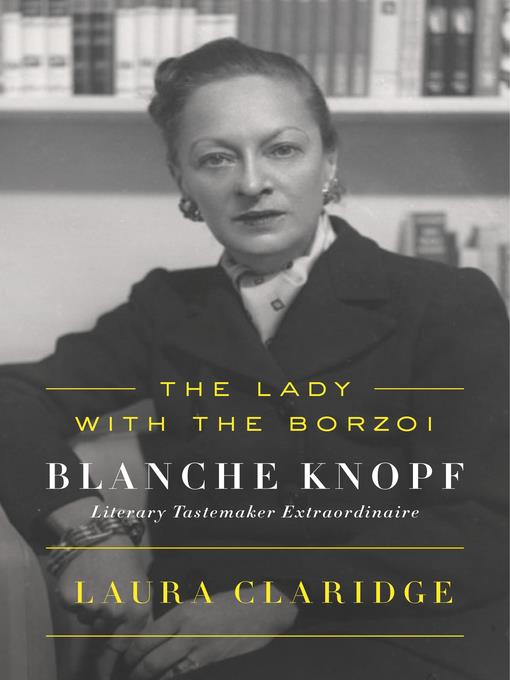
The Lady with the Borzoi
Blanche Knopf, Literary Tastemaker Extraordinaire
کتاب های مرتبط
- اطلاعات
- نقد و بررسی
- دیدگاه کاربران
نقد و بررسی

December 21, 2015
Blanche Knopf was a full partner in the esteemed publishing company Alfred A. Knopf (named for her husband) from its founding in 1915 until her death in 1966. The case made here by biographer Claridge (Emily Post) is that, of the two partners, Blanche led the more interesting life. Shortly after marrying, Blanche and Alfred settled into a somewhat distant relationship and lived apart much of the time. Their lives revolved around books, with Blanche’s many prestigious acquisitions including works by multiple Nobel Prize winners, Khalil Gibran, Dashiell Hammett, Willa Cather, Sigmund Freud, and countless other prominent authors. Claridge recounts Blanche’s struggles with depression, intense love of dogs, and affairs with other men. Blanche’s marriage was often fraught, but her friendship with writers H.L. Mencken and Carl Van Vechten helped sustain her emotionally. Claridge’s storytelling is mostly clear and linear, but she occasionally omits narrative transitions, which can cause confusion for the reader. However, she manages to synthesize an enormous amount of research and biographical information to paint a complete picture of a complex figure. Packed with interesting literary anecdotes, this biography reveals a powerful woman who played an integral role in 20th-century publishing. Agent: Carol Mann, Carol Mann Agency.

December 15, 2015
A prestigious publishing house and the strong-willed woman who guided it. In 1911, when 17-year-old Blanche Wolf (1894-1966) met Alfred Knopf, she felt immediately "drawn to his intellectual manner and self-possession." By the time they married in 1916, they had already begun a publishing firm "devoted to high-quality fiction and nonfiction." Biographer and journalist Claridge (Emily Post: Daughter of the Gilded Age, Mistress of American Manners, 2008, etc.) details the firm's development, unfortunately allowing chronology to dominate the narrative. In charge of fiction and poetry, Blanche amassed an estimable list of writers: within a few years, that list included T.S. Eliot, Willa Cather, Robert Graves, Elinor Wylie, Ezra Pound, H.L. Mencken (who became Blanche's confidant), and Carl Van Vechten, who became a close friend and "perfect scout." Through Van Vechten, Blanche connected with, and published, many Harlem Renaissance writers and modernists. Yet despite her ability to lure authors, she found herself "blithely dismissed" and often rudely disdained by Alfred and his overbearing father, who interfered relentlessly in the couple's personal and professional lives. Rather than standing up for his wife, Alfred always "defended to the last the father he chose to remember as always being there for him." Along with documenting Blanche's prowess as a publisher, Claridge diligently chronicles her difficult marriage. Alfred was as obstreperous at home as he was at the office--to her and their only son, Pat. She was so worried about Alfred's nastiness to Pat that she enrolled him in boarding schools, although she herself showed little maternal warmth. Pat said that earning his pilot's wings was the only time his father seemed proud of him. Blanche responded to her marital problems by taking many lovers, including Leopold Stokowski, Jascha Heifetz, and Serge Koussevitsky. A chain smoker and heavy drinker, Blanche ruined her health by dieting to alarming thinness. Nearly blind, she died of cancer in 1966. A straightforward recounting of the difficult life of a woman of discerning literary taste.
COPYRIGHT(2015) Kirkus Reviews, ALL RIGHTS RESERVED.

Starred review from March 15, 2016
Claridge (Emily Post: Daughter of the Gilded Age, Mistress of American Manners) presents a fascinating look at Blanche Knopf (1894-1966), an extraordinarily gifted reader, editor, and arbiter of literary taste. Married to Alfred A. Knopf (who had promised her equal treatment in the eponymous publishing house, cofounded with her in 1915), she was well known in literary and arts circles in the United States, Europe, and South America but was often overlooked in her husband and father-in-law's quest to build a publishing empire. Until now, her efforts on behalf of literature have long been ignored or relegated to Alfred's shadow. VERDICT Filled with insights into the literary intrigues of the times and Blanche's careful handling and promotion of "her" writers as well as the house's authors, this biography is highly recommended to readers who are interested in modernist literature, American literature, publishing, and creative writing.--Pam Kingsbury, Univ. of North Alabama, Florence
Copyright 2016 Library Journal, LLC Used with permission.

Starred review from March 1, 2016
Although it carries the name Alfred A. Knopf, the prestigious publishing house founded in New York City in 1915 would not exist if it weren't for Blanche Knopf. Claridge (Emily Post, 2008) is the first to bring Blanche Wolf Knopf fully out of the shadows in this meticulous, groundbreaking biography. Blanche and Alfred agreed to be equal partners as publishers, but a shared love of literature did not foster a happy marriage or felicitous working relationship, causing Blanche perpetual anguish as Alfred failed to acknowledge her essential role in the company until her final years. Nonetheless, she persevered, becoming a powerful literary force by virtue of her zeal, acumen, extraordinary prescience, impeccable taste, magnanimous sociability, and stoicism. Buoyed by her close friends and advisers, H. L. Mencken and Carl Van Vechten, Blanche signed epoch-defining writers, including Willa Cather, Thomas Mann, Langston Hughes, Wallace Stevens, Dashiell Hammett, and Raymond Chandler. Blanche knew everyone, loved to party, had many affairs, traveled often to Europe, and crisscrossed South America during WWII, discovering authors and gathering intelligence about Nazi sympathizers for the State Department. Concealing her sorrows and the misogynist injustices she endured, Blanche worked relentlessly, achieved mightily, and ultimately destroyed her health. Claridge illuminates a radiant facet of American publishing and women's history as she portrays Blanche Knopf in all her brainy and aesthetic glory and elegant fortitude.(Reprinted with permission of Booklist, copyright 2016, American Library Association.)

























دیدگاه کاربران